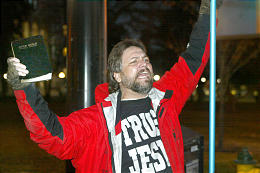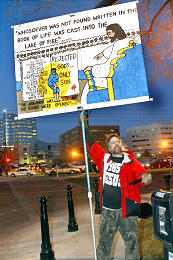
Lonnie Pursifull spreads message on State Street in Salt Lake City.
Tom Smart, Deseret News
Street preacher on mission in Salt Lake
By Brady Snyder
Deseret News staff writer
Disliked by many
and enjoyed by few, in-your-face, megaphone-wielding street preacher Lonnie Pursifull is
not hindered by such reactions in his call to spread — and define — the gospel
on the streets of Salt Lake City and beyond.
 Lonnie Pursifull spreads message on State Street in Salt Lake City. Tom Smart, Deseret News |
"I know I'm an unpopular person in Utah as far as
that a lot of people don't like me," he says. "I'm not in this for
popularity."
Pursifull's critics range from Salt Lake City's
ultra-liberal left to its ultra-conservative right. Notables from Mayor Rocky Anderson to
The Church of Jesus Christ of Latter-day Saints to the Salt Lake Theological Seminary have
spoken against Pursifull's brash style.
Pursifull has gained a degree of notoriety during the
ongoing Main Street Plaza feud as a constant critic of the LDS Church and its attempts to
regulate conduct — including street preaching — on the church-owned plaza.
Armed with his "funnel of truth" — the name
he gives his cheerleader-type megaphone — Pursifull rebukes Utah's dominant religion,
other "sinners" and anyone else with an ear to hear.
"I get dirty looks from everybody," he said.
As a carpet layer and rug designer by day, Pursifull's
commitment to aggressive street preaching has deflated his wallet.
"A lot of my clients were Mormon people," he
said. "I've lost a lot of work over it."
But that hasn't stopped Pursifull from taking to the
streets and sidewalks to rebuke the LDS Church, homosexuals, atheists and even evangelical
Christians be believes have strayed from what he considers core biblical teachings. The
Baptist insists he is called to preach not only to LDS Church members but anyone who so
strays.
"We don't just preach to the Mormons," he said.
"We preach all over the state. The Mormons just happen to be on the list some of the
time."
 Lonnie Pursifull says he's unpopular with many Utahns but won't let that hinder his work. Tom Smart, Deseret News |
And, he said, the message isn't all negative. Pursifull
offers hope, too.
"We go and show them their sin and then we show them a
way out — faith in Jesus Christ," he said. "If we just went there and
bashed them and trashed them, we wouldn't be doing them no good."
Pursifull's identification with the Main Street Plaza
controversy has brought out the critics.
"There certainly is a time and place for the
conveyance of their message, but the middle of the plaza should not be the place,"
Mayor Anderson said, "especially when wedding celebrations are being
interrupted."
Even the Salt Lake Theological Seminary, which disagrees
with LDS Church doctrine, held a press conference to denounce Pursifull for using
"bombastic" and "mean-spirited" methods to preach the gospel.
Pat Edwards of Grace Baptist Church in Bountiful said
Pursifull and others like him represent a small minority of Christians, and then made an
appeal to members of the LDS Church.
"Let me simply ask the members of The Church of Jesus
Christ of Latter-day Saints to forgive us in not supporting you, in not speaking out
sooner," he said.
Pastor Jason Wallace of Christ Orthodox Presbyterian
Church, which is "radically opposed" to the LDS Church in a number of ways, says
Pursifull's preaching is too over the top.
Still, Pursifull says he is called to preach the gospel and
will continue despite veiled threats from City Hall to toss him in jail for disturbing the
peace. He compares his plight to John the Baptist, Jesus and the Apostle Paul, all of whom
were imprisoned and later killed for preaching the gospel.
Pursifull has been preaching near the LDS Temple for eight
years and is personally familiar with the LDS Church. As a child, Pursifull's mother was
LDS. On her death bed, however, she spoke with a Baptist minister, quit the LDS Church and
"got saved," as Pursifull puts it.
The Baptist upbringing didn't stop Pursifull from attending
LDS Church services for seven months because he was in love with an LDS girl.
But Pursifull perceived differences between the doctrine of
Jesus Christ taught by the LDS Church and the doctrine of Jesus he found in the Bible. So
he left.
The chief reason he began preaching was because
"Mormon missionaries were always coming to my house and teaching me things that
aren't in the Bible," he said.
That said, the man has deep familial connections to the LDS
Church. His great-great grandparents came to Salt Lake City in a wagon train with Brigham
Young and even hauled granite used for building the LDS Temple, Pursifull said.
His beefs with the LDS Church are largely doctrinal and
concern its push to be considered "Christian," a moniker many Baptists and
evangelical Christians refuse to bestow upon the LDS faith.
There are many reasons the LDS Church should not be
considered Christian, Pursifull said.
The LDS doctrine of salvation, for instance, relies too
heavily on good works and not enough on faith in Jesus Christ, he said. He has issues with
LDS doctrine that teaches Jesus and Satan were once brothers. And he does not accept the
LDS doctrine that man, after resurrection, can become like God with similar powers.
"They try and deceive people that they are
Christians," Pursifull said. "That's really what stepped up the heat against the
Mormon Church."
Daniel Peterson, a professor of Islamic studies at Brigham
Young University, disagrees with Pursifull. He wrote a book arguing that all LDS doctrines
have been incorporated by different Christian sects at some point in history.
Peterson insists that while Mormonism isn't the same as
traditional Christianity, it is a Christian faith because it is based on Jesus Christ.
Pursifull also preaches outside atheist rallies, homosexual
parades and City Hall. He even targeted the Salt Lake Theological Seminary, following the
seminary's press conference.
"A lot of other people are dying and going to hell,
not just the Mormons," he said. "There are Catholics going to hell. There are
Baptists going to hell."